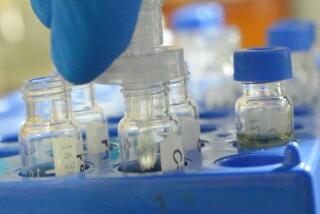Employee Drug Tests Often Unreliable, Panel Is Warned
WASHINGTON — Laboratory testing of employees for drug use is often unreliable--a second test is always needed--but many employers do not know that, an official of Congress’ Office of Technology Assessment warned Wednesday.
Furthermore, no mechanisms exist for checking test standards or the laboratories that are cropping up to respond to the growing demand for urine drug tests, said the official, Dr. Lawrence Miike, a senior associate in the office’s health program.
“If you have the money, you can just about set up your own lab,” he said.
Miike delivered his assessment at a hearing of a House Government Operations subcommittee that is considering possible standards for the drug testing industry.
Tests Become Widespread
Concerns about the quality and use of tests have been raised in Congress and among civil liberties advocates as many large corporations and government agencies have begun requiring testing of workers in safety-related positions and of all new job applicants.
Miike said that current research on urine tests--the most common and economical procedure in use--reflects a need for tough standards.
Checks on laboratories by outside examiners have shown that 25% to 75% of samples that should have tested positive for drug use made it through undetected, he said, undercutting employers’ screening programs. Also, he said, some positive readings are later being proven erroneous.
“Available urine drug screening tests, when performed by qualified laboratory personnel, are highly accurate and reliable,” he said, but only when appropriate procedures are used and results are confirmed by follow-up tests “based on different physical and chemical principles.”
Employers May Fear Cost
Miike said that relatively few employers are aware of the need for a second test, and some may be reluctant to require it because of the cost, thereby penalizing some innocent candidates.
Already, the costs are massive, he said. The Defense Department spent $52 million testing 3.6 million employees last year. About 92,000 workers were found to be using drugs through two sets of tests. Thus, the military spent more than $500 to detect each drug user.
Citing wide variances in the quality of the testing provided by private laboratories, Miike endorsed an approach proposed in the California Legislature. A bill introduced by Assemblyman Johan Klehs (D-San Leandro) would require laboratories to register with the state and comply with rigid administrative standards.
Suits Called Hard to Win
Allan Adler, legislative counsel for the Washington office of the American Civil Liberties Union, said that the reliability of tests is a crucial issue because job applicants have little recourse when they are denied employment based on a drug test. Although an applicant can file suit contending that he has a right to a job, winning such a case is very difficult, he said.
Also, Adler said, the organization fears that corporations in the same business will start pooling their test results to cut costs, thereby posing the prospect that an applicant or worker rejected because of a false positive reading would have difficulty finding employment anywhere in his field.
More to Read
Sign up for Essential California
The most important California stories and recommendations in your inbox every morning.
You may occasionally receive promotional content from the Los Angeles Times.










